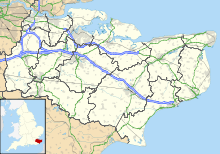Rochester Cathedral
| Rochester Cathedral | |
|---|---|
| Cathedral Church of Christ and the Blessed Virgin Mary |
|

Rochester Cathedral
|
|
| Coordinates: 51°23′20″N 0°30′12″E / 51.388962°N 0.503293°E | |
| OS grid reference | TQ 74273 68521 |
| Location | Rochester, Kent |
| Country | England |
| Denomination | Church of England |
| Website | rochestercathedral.org |
| History | |
| Former name(s) | Priory of St Andrew (604–1542) |
| Founded | 604 |
| Founder(s) | St Justus |
| Consecrated | 604 |
| Past bishop(s) |
John Fisher Nicholas Ridley |
| Architecture | |
| Status | Cathedral |
| Functional status | Active |
| Heritage designation | Grade I |
| Designated | 24 October 1950 |
| Architect(s) | Gundulf of Rochester |
| Style | Norman, Gothic |
| Years built | 1079–1238 |
| Specifications | |
| Bells | 10 (full circle) |
| Tenor bell weight | 30 long cwt 14 lb (3,374 lb or 1,530 kg) |
| Administration | |
| Diocese | Rochester (since 604) |
| Province | Canterbury |
| Clergy | |
| Archbishop | Justin Welby |
| Bishop(s) | James Langstaff |
| Dean | Philip Hesketh |
| Precentor | Matthew Rushton |
| Canon Pastor | Phil Hesketh |
| Canon Missioner | Jean Kerr |
| Archdeacon | Simon Burton-Jones, Archdeacon of Rochester |
| Laity | |
| Director of music | Scott Farrell |
| Business manager | Edwina Bell |
Rochester Cathedral, formally the Cathedral Church of Christ and the Blessed Virgin Mary, is an English church of Norman architecture in Rochester, Medway.
The church is the cathedral of the Diocese of Rochester in the Church of England and the seat (cathedra) of the Bishop of Rochester, the second oldest bishopric in England after that of the Archbishop of Canterbury. The edifice is a Grade I listed building (number 1086423).
The Rochester diocese was founded by Justus, one of the missionaries who accompanied Augustine of Canterbury to convert the pagan southern English to Christianity in the early 7th century. As the first Bishop of Rochester, Justus was granted permission by King Æthelberht of Kent to establish a church dedicated to Andrew the Apostle (like the monastery at Rome where Augustine and Justus had set out for England) on the site of the present cathedral, which was made the seat of a bishopric. The cathedral was to be served by a college of secular priests and was endowed with land near the city called Priestfields.
Under the Roman system, a bishop was required to establish a school for the training of priests. To provide the upper parts for music in the services a choir school was required. Together these formed the genesis of the cathedral school which today is represented by the King's School, Rochester. The quality of chorister training was praised by Bede.
The original cathedral was 42 feet (13 m) high and 28 feet (8.5 m) wide. The apse is marked in the current cathedral on the floor and sets outside show the line of the walls. Credit for the construction of the building goes to King Ethelbert rather than St Justus. Bede describes St Paulinus' burial as "in the sanctuary of the Blessed Apostle Andrew which King Ethelbert founded likewise he built the city of Rochester."
...
Wikipedia

